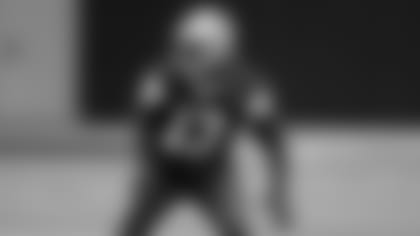This story originally appeared in Dallas Cowboys Star Magazine. For subscription information, please click here.
National Football League starting quarterback. It's probably the most difficult job in all of sports, and only 32 such roles are available. However, there are never 32 players who can run an offense effectively.
In reality, there might be 20-25 capable players in the entire league at any given time. It just so happens the Cowboys have a pair of the world's two dozen best signal-callers, Tony Romo and Kyle Orton. As Jason Garrett is fond of saying, the Cowboys value the quarterback position from top to bottom. And though one of them is taking the vast majority of the snaps on Sundays, the day-to-day job is very much the same for all the quarterbacks on the roster.
"It's the same thing every year," Orton says. "Just be the best player you can be. As a quarterback, your game is always changing, your technique is always changing, your mental capacity is always changing. Just to have your game as good as it's ever been, that's always the goal."
With their head coach himself a former backup QB in the NFL, it was no surprise this offseason that the Cowboys went out and signed a player they believe is the league's best No. 2 in Orton.
What was surprising is the fact Orton took the job.
"I think he could be starting for a lot of teams in this league," says Cowboys quarterbacks coach Wade Wilson, also a former Dallas backup. "But he's just kind of been in some situations that weren't real conducive to being happy. He's certainly a competitive guy. He's not content being a backup player. He just looks at himself as the player to play if something were to happen to Tony."
The NFL being a rather close-knit fraternity, maybe it shouldn't be so surprising, in retrospect, that Orton chose to come to Dallas to reunite with Wilson, his position coach in Chicago as a rookie, rather than try to compete for a starting job in, say, Miami, Cleveland, Minnesota, Jacksonville, Arizona, Seattle or Tennessee.
Orton's been The Guy on every team he's played for, but has been cast as a journeyman, for whatever reason, until now.
He took the Bears to the playoffs as a rookie and posted a winning record every year he started in Chicago, yet found himself traded after the 2008 season. He threw 41 touchdowns against just 21 interceptions over two years with the Broncos, but became the fall guy in Year 3, giving way to the Tim Tebow experiment. The Cowboys tried to claim him on waivers last year, but he was snatched up by Kansas City, going on to topple the previously undefeated Packers in his very first start with the Chiefs, who elected not to re-sign him after the season.
It has been a long, long road for Orton to find a professional home, but he has one in Dallas. Football is an unpredictable sport, but after he started 15 games for the Bears in 2005, his first year out of Purdue, no one could've expected the path Orton's career would take. Forced into the lineup after Rex Grossman and veteran Jeff Blake were injured in the '05 preseason, Orton's steady hand helped Chicago to an NFC North title.
"Looking back, I wouldn't have changed anything," Orton says. "To be able to play at a young age, you learn a lot of stuff. You learn on the run. And we were winning games, so it wasn't just hey, go out there and it's OK if you make mistakes. It was win games and do whatever it takes. I was fortunate enough to be on a really good team in Chicago and we won nine in a row and made the playoffs. It was a great way to start my career.
"It was such a shock. Everything happened so fast. … The next thing you know, you're opening up at FedEx Field against Washington. And then we got on a run, starting in the third or fourth game of the season, so there was no letting up. Just put your head down and keep grinding."
With that approach, Orton specifically won the respect of his position coach, Wilson.
"He came in and really worked very hard learning the stuff," Wilson says. "He's a really smart guy, and really worked at his craft, not anticipating him having to start a bunch of games for us that year."
An eighth-round pick in the 1981 draft who went on to start 69 games in his career before settling into a backup role in his later years, Wilson, primarily, was responsible for guiding Orton through the ups-and-downs of an NFL campaign. They went their separate ways after three seasons together, with Wilson returning to the Cowboys in 2007, but the two kept up with one another.
The relationship is different now that they are back working together, Orton acknowledges, but Wilson is very much the same.
"He was such a great coach for me as a young player," Orton says. "Wade's a soft-spoken guy. He wasn't a yeller and a screamer, but he just has such knowledge from actually playing the position for so many years, that when he tells you something, he doesn't try to over-coach you. He's right to the point and really good for a young quarterback to learn. And now I've gotten more experience and we've got a ton of experience in the room with Tony and myself and Wade that our meetings are so fun and dynamic. I think all three of us learn stuff."
Leadership wasn't expected from a 22-year-old fourth-round pick in 2005, but those who observed him then and now are not surprised that he has the ability to command a locker room, even from a backup role. Before signing with the Cowboys in March, Orton consulted former Dallas backup Jon Kitna, who told him Valley Ranch offered a healthy environment with room for leadership by example.
"The quarterback position, innately, is a leadership role," Wilson says. "Kyle will do whatever he can. He's certainly not going to overstep his bounds and step on Tony's toes or anything like that, but he has the respect of the locker room. He's not afraid to get in a guy's face if that's what it calls for. He understands his role, but he wants to help the team win."
For Orton, the most obvious way to help the team, other than to stay ready in the event of an injury to Romo, is to practice hard every day. With only two quarterbacks on campus, he is left to take all of the scout team reps, simulating the opposing offense that Rob Ryan's defense will face in the coming week.
For a pocket passer like Orton, it's a bit of a challenge to play the part of a Michael Vick or Robert Griffin III, just as Wilson wasn't a Randall Cunningham doppelganger all those years ago. But everyone has their job to do, regardless of the circumstances, and Orton tries to make the most of each situation and pull his fellow scout-team players along with him at the same time.
"I'm happy to get those reps," Orton says. "That's really my time to get ready for the game in case I've got to go in, and I try to get these young guys ready and work hard in practice and get better. You've just got to get out of it anything you can. There're a lot of ways you can get better in practice. It's actually tougher on the scout team. The looks are tougher. You're being game-planned against by the first defense, so the windows are certainly a lot smaller. I try to tell the young guys to take it as seriously as you can because you can definitely get better, and I've made myself a better player in those situations."
Orton was named the Cowboys' scout team player of the week for his work in preparation of the season-opening win against the New York Giants. The honor was voted on by the team's defensive coaches, who were impressed by Orton's command of where to throw the ball while mimicking the opposing offense.
The backup's work ethic is not only an example to the locker room as a whole, but to the starter as well. Orton can provide support for Romo.
"He's a real pro," Garrett says of Orton. "I think he understands the situation. He's been a starter in this league. He's been a backup in this league. I think he understands the importance of team chemistry and chemistry within that quarterback room."
Even though he only has a couple more months in the Cowboys' offense than his week pretending to run that of the Giants, Orton is still confident enough in the playbook to push Romo and Wilson in the Dallas system.
"Everybody recognizes his skill set, so I think that even motivates Tony to be a better player," Wilson says. "Tony responds to that, and they bounce ideas off each other in the room and are not afraid to disagree with each other respectfully, and I think it's healthy. It's a really good room. And I think because they're both such good athletes and good quarterbacks, it makes the other guy better as well."
Only those who have played quarterback at the highest level can truly know what all goes into preparing for a game, and how each of the 32 starters needs all the help he can get – from his head coach, offensive coordinator, quarterbacks coach and even his backup.
Again, the Cowboys value the position.














